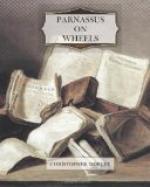“The Sage looks like Bernard Shaw,” whispered Mifflin.
I always believe in drawing first blood.
“Good-morning, Andrew,” I called cheerfully. “Want to buy any books?” I halted Pegasus, and Andrew stood a little in front of the wheel—partly out of breath and mostly out of temper.
“What on earth is this nonsense, Helen?” he said angrily. “You’ve led me the deuce of a chase since yesterday. And who is this—this person you’re driving with?”
“Andrew,” I said, “you forget your manners. Let me introduce Mr. Mifflin. I have bought his caravan and am taking a holiday, selling books. Mr. Mifflin is on his way to Port Vigor where he takes the train to Brooklyn.”
Andrew stared at the Professor without speaking. I could tell by the blaze in his light-blue eyes that he was thoroughly angry, and I feared things would be worse before they were better. Andrew is slow to wrath, but a very hard person to deal with when roused. And I had some inkling by this time of the Professor’s temperament. Moreover, I am afraid that some of my remarks had rather prejudiced him against Andrew, as a brother at any rate and apart from his excellent prose.
Mifflin had the next word. He had taken off his funny little cap, and his bare skull shone like an egg. I noticed a little sort of fairy ring of tiny drops around his crown.
“My dear sir,” said Mifflin, “the proceedings look somewhat unusual, but the facts are simple to narrate. Your sister has bought this van and its contents, and I have been instructing her in my theories of the dissemination of good books. You as a literary man...”
Andrew paid absolutely no attention to the Professor, and I saw a slow flush tinge Mifflin’s sallow cheek.
“Look here, Helen,” said Andrew, “do you think I propose to have my sister careering around the State with a strolling vagabond? Upon my soul you ought to have better sense—and at your age and weight! I got home yesterday and found your ridiculous note. I went to Mrs. Collins, and she knew nothing. I went to Mason’s, and found him wondering who had bilked his telephone. I suppose you did that. He had seen this freight car of yours and put me on the track. But my God! I never thought to see a woman of forty abducted by gypsies!”
Mifflin was about to speak but I waved him back.
“Now see here Andrew,” I said, “you talk too quickly. A woman of forty (you exaggerate, by the way) who has compiled an anthology of 6,000 loaves of bread and dedicated it to you deserves some courtesy. When you want to run off on some vagabond tour or other you don’t hesitate to do it. You expect me to stay home and do the Lady Eglantine in the poultry yard. By the ghost of Susan B. Anthony, I won’t do it! This is the first real holiday I’ve had in fifteen years, and I’m going to suit myself.”
Andrew’s mouth opened, but I shook my fist so convincingly that he halted.




